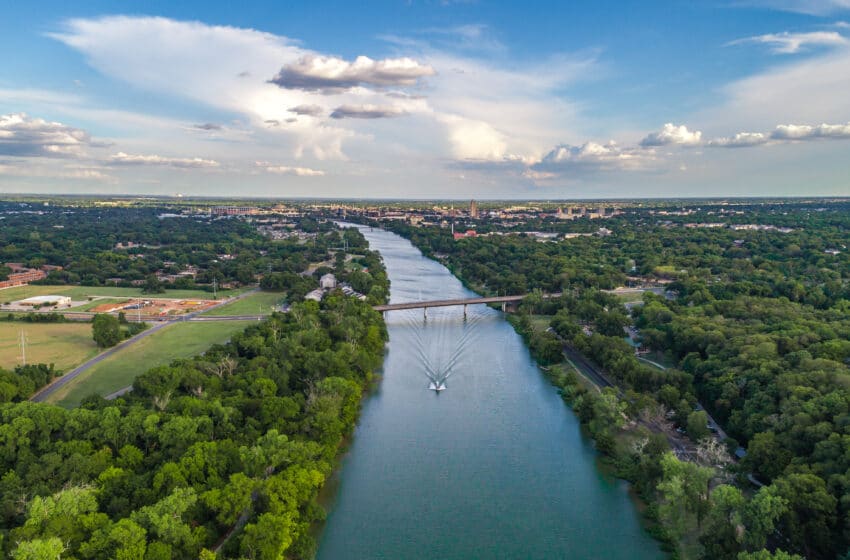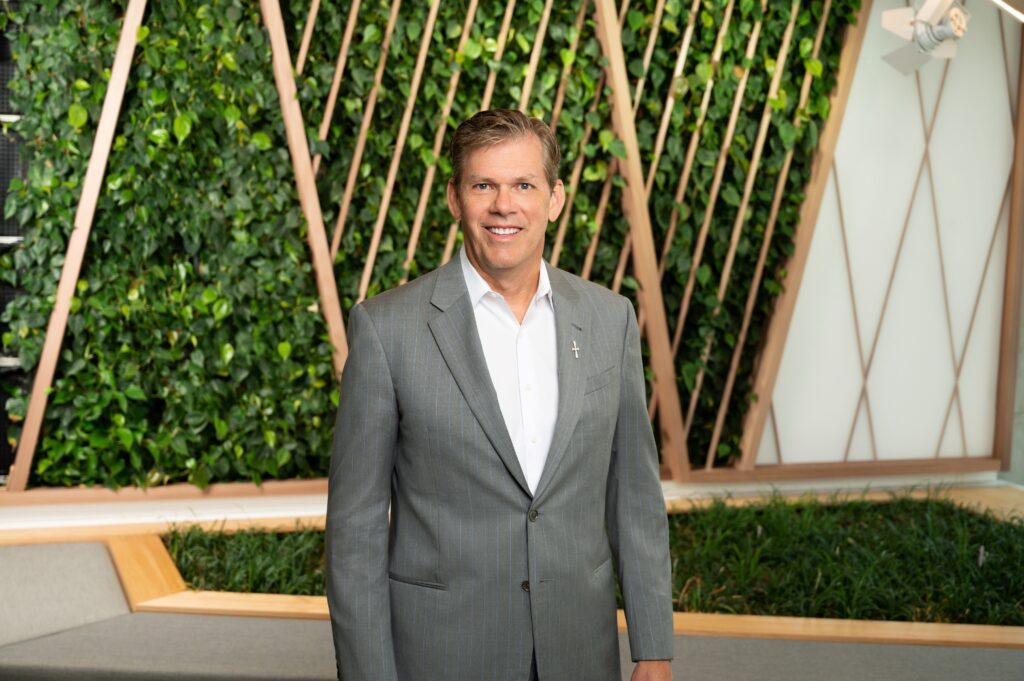Waking Up Waco

A remarkable renaissance is taking place in this once-sleepy city.
In a discussion regarding Amazon’s meteoric success, CEO Jeff Bezos once remarked, “What’s dangerous is not to evolve.” That simple, straightforward insight is especially germane to the City of Waco’s recent renaissance. For so long, sleepy Waco, Texas, was just a pit stop along IH-35, in between the bigger, brighter cities: Dallas and Austin. Home to equally dormant Baylor University and its Baylor Bears, Waco seemed to tread water, existing peacefully, if not at times notoriously, but hardly seeking growth, change, or evolution.
That changed in 2001, when the Baylor University Board of Regents undertook an ambitious plan called Baylor 2012. The plan aimed to remake the university, evolving it from a well-regarded but often overlooked regional university into an academic and athletic powerhouse revered on the national stage. Two decades later, the results are no less than awe-inspiring: $400 million spent on facilities, including a new law school, a new science building, and McLane Stadium (a crown jewel perched prominently on the IH-35 corridor); $45 million spent on the Baylor Research and Innovation Collaborative; 24 doctoral programs available to postgraduate students and quadrupled faculty publications in major journals; a multibillion-dollar endowment; countless Big 12 and national championship titles, and even a Heisman Trophy winner. Baylor has arrived, and with it, so has the City of Waco.
Perfectly located with easy access to one of the nation’s most traveled interstates, Waco has long been ripe for growth. Low cost of living, no state income tax, abundant access to healthcare (Waco benefits from two large healthcare systems, plus a VA hospital), and cheap housing offered excellent opportunities to entrepreneurs and large corporations alike. However, for the longest time, people just didn’t move to Waco. The city seemed to discourage growth. Rumors pervaded claiming the powers that be particularly opposed chain restaurants. (As a kid, when news broke that Chili’s was moving to Waco, the first chain to open its doors in Waco, it was cause for immediate and extraordinary celebration.) In general, growth opportunities seemed wanting while obstacles for that growth seemed abundant. People and companies just didn’t move to Waco.
Then, hand in hand with Baylor University’s evolution, Waco woke up. The Chamber of Commerce began working hand in hand with businesses eyeing Waco’s ideal location and low cost of real estate. City planners and the City Council evolved their thinking, and the tax climate became an incentive to companies considering relocation to—or creation of satellite locations in—Waco. Within just a few years, Waco began to see growth in sectors like advanced manufacturing, aerospace and defense, supply chain management, and professional services.
During the same time, Waco’s healthcare systems merged with larger systems, advancing compensation to the top percentiles and thus attracting physicians, nurses, administrators, and more. Baylor University, the largest employer in the region, brought scholars, development officers, coaches, and staff from around the world in their quest for growth. As Waco began to grow, restaurants began to open, gyms moved to Waco, movie theaters were built, and a tourism industry, built from the success of an HGTV show, emerged overnight. Waco arrived.
As a local who moved to Waco just before the beginning of Kindergarten, this was fascinating to see. Once upon a time, because my parents were not graduates of Baylor University and because we didn’t attend a Baptist church, we were seen as outsiders. Now, today, during a jaunt down to BJ’s, a California-based brewhouse and restaurant, you can strike up a conversation with a SpaceX employee who moved to Waco from California, an engineer from Tennessee who’s building Waco’s new Amazon distribution center, an attorney from Ohio working at franchise giant Neighborly, a neurosurgeon from Arizona who was recruited by a local healthcare system, or a tourist from Wisconsin who just had to see what Waco was all about. In a short time, Waco has emerged as an exceptional midsize city—not too big, not too small, but just right.
In my business, managing a real estate brokerage and residential design and construction management company, these changes are readily apparent. As people move to Waco, they bring with them perspectives shaped by the markets they’re moving from. Their needs, preferences, and budgets are distinctly different from traditional homebuyers in Waco. In the past, the white-collar rental was a foreign concept, because people rarely moved to Waco.
Baylor has arrived, and with it, so has the city of Waco.
Most residents were born in Waco, matriculated in Waco, likely attended Baylor or graduated from nearby universities in College Station, Austin, or Lubbock, married here, and began raising their family here. Housing was abundant and cheap. People knew the market well because of their long tenure in the area, so they simply purchased a home. Rental markets were reserved for those needing public assistance or those who couldn’t muster the down payment for a home.
Today, that market too has evolved. With the development of Waco’s job market came an influx of white-collar professionals unfamiliar with the area, both in terms of its stability and its preferred neighborhoods. While they learned the area and overcame their fears of traditional volatility—which they may have experienced in the markets they moved from—they sought to rent homes in better neighborhoods with nicer finish-out and better amenities.
The market for homebuyers has shifted even more dramatically. Because Waco is positioned between two large cities and only three hours from Houston, many people consider Waco solely because of its central location. Baby Boomers, many of whom are Baylor University alumni and are particularly excited about their team’s prowess in football, basketball, tennis, softball, baseball, and even equestrian events, are moving to Waco in droves. Whether they’re seeking proximity to their children and grandchildren, wishing to participate in Baylor activities, seeking an income tax–free climate, or are drawn to the low cost of living and access to healthcare (which has led USAA to continually rate Waco as one of the best places for military retirees to live), they find Waco particularly enticing.
In turn, homes are selling briskly and for higher numbers than many longtime residents can fathom. Smaller homes, condos, and historical homes, all once negatively regarded, are hot commodities: They’re unique, super rare, and limited in supply. Whereas just a decade ago the market seemed to demand a single, homogenous product, now the sky’s the limit if you’re seeking to build or remodel a high-end property. What was once classified as “too far out” is now well within the search area for home buyers accustomed to hours of their days spent sitting in traffic. Waco’s real estate market has fundamentally changed and now represents many of the benefits of bigger cities but without any of the tradeoffs.
Free of traffic, congestion,political upheaval, and high cost of living, Waco has become the spot for residents seeking a midsize city.
Free of traffic, congestion, political upheaval, and high cost of living, Waco has become the spot for residents seeking a mid-size city. For better or worse, COVID has had little effect on our local economy or way of life. For the most part, restaurants and bars remained open, groceries were plentiful, and most businesses stayed upon, undeterred by the shutdown and mandates other cities and states experienced.
When joining these realities with job market growth across multiple sectors, it’s easy to see what makes Waco so alluring to so many people. In turn, as more people from across the globe move to Waco, the city continues its renaissance. Wacoans now enjoy yoga studios, premium diaper manufacturing, Top Golf, sushi bars, rocket building, breweries, March Madness, doula services, jet engine installation, heavy equipment manufacturing, tourism, preeminent, scholarly expertise across many disciplines, and a nationwide, positive perception of their city.
As the pace of Waco’s evolution accelerates, so does the growth and prominence of our once sleepy city. Waco is a bustling midsized city in the Heart of Texas whose time has finally arrived. It’s an outstanding place to live, visit, and grow a business.






